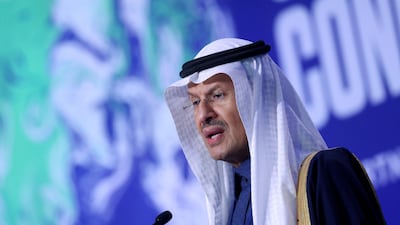Global oil price volatility would be worse without the efforts of the Opec+ alliance that have helped stabilise the market, said Saudi Arabia's oil minister.
There can be no discussions of climate change without energy security, Saudi Energy Minister Prince Abdulaziz bin Salman said on Tuesday during a panel at the World Government Summit in Dubai.
“If it wasn't for Opec+ we will not be celebrating the sustainable energy market … Volatility would have been even worse if Opec+ had not got together,” he said. “You cannot attend to climate change without getting into energy security.”
For several months, the 23-member Opec+ alliance of producers led by Saudi Arabia and Russia has worked to bring back 5.8 million barrels per day in output cuts, with another 400,000 bpd due in April, to restore supply that was greatly reduced after the onset of the Covid-19 pandemic in 2020. The alliance achieved a historic reduction of 9.7 million bpd between May 2020 and July last year. The groups meets this Thursday to assess the market and decide output levels.
Brent, the global benchmark for two thirds of the world's oil, was trading 6.21 per cent lower at $105.5 a barrel at 4.36pm UAE time on Tuesday, while West Texas Intermediate, the gauge that tracks US crude, was down 6.40 per cent trading at $99.18 a barrel.
Both benchmarks have receded from 14-year highs reached earlier this month, with the most recent declines related to China, the world's largest crude importer, imposing lockdowns related to Covid outbreaks, including in Shanghai.
Oil prices also began to trade lower on Tuesday as Russia said it has decided to drastically cut its military activity focused on Kyiv and Chernihiv in Ukraine amid signs that their peace talks in Turkey are making headway.
"The fact that Russia is going to scale back its military presence near Kyiv is excellent news, and hence we see traders backing riskier assets," said Naeem Aslam, chief market analyst at Avatrade.
"As for the oil price, it has plunged and trading sharply lower because if the conflict comes to an end, we are likely to see fewer issues with Russian energy. Yes, it will not be that easy to roll back those sanctions, and traders are aware of that fact; however, there will be no further sanctions, and this is a good sign in terms of oil supply."
Oil prices have been volatile, with the market roiled by Russia's military offensive in Ukraine and the widening of pandemic-related lockdowns in China, the world's largest crude importer. Brent has risen about 45 per cent since the start of the year.
"Oil’s volatility continues to make eye-watering viewing, but increasingly, the moves are being driven by falling liquidity in the futures markets, and the exchanges’ itchy trigger fingers on raising margins," said Jeffrey Halley, senior market analyst at Oanda.
“We are trying to maintain order and decouple politics from energy and affordability,” Suhail Al Mazrouei, the UAE's Minister of Energy and Infrastructure, said during the joint panel, reiterating comments he made on Monday.
The sole mission of Opec+ is to stabilise the market and politics cannot be mixed with the organisation's work, he said.
“Our aim is to calm the market, try to come up with volumes as much as possible,” he said. “If we are asking anyone to leave then we are raising the prices and doing something that's against what consumers want, what consumers are crying out for in many countries around the world who cannot afford where prices could go and are asking us to calm the prices, try to bring more resources.”
_______________________
The World Government Summit 2022 - in pictures
_______________________
Squeezing any partner out of the oil alliance would only increase prices, Mr Al Mazrouei said.
“How can we contradict … the objective, which serves the whole world by bringing affordable sources of energy, by squeezing or asking to squeeze some of the partners out? We cannot. If a country decides unilaterally … they have all the right to select from which resources they buy, but we cannot decide for all the countries in the world and say 'you cannot buy these barrels'. I think that's something that's outside Opec.”
Russia, which produces about 10 million barrels per day or around 10 per cent of the world's global output, makes a “sizeable” contribution to energy markets, the Saudi oil minister said.
Opec+ must “compartmentalise” political differences for the collective good of all and leave politics at the door ahead of its meetings, he said.
If the security of oil supply is threatened, the world economy will suffer, the prince said, underscoring the importance of prioritising security of supplies.
There will be growth in oil demand and there is a need to incentivise investments in the hydrocarbon sector, Mr Al Mazrouei said.
There is difficulty in predicting where the oil market volatility is heading, given lack of clarity on whether Iranian oil barrels will come to market and whether there will be further investments in the oil and gas sector, he said.
Mr Al Mazrouei said the Opec+ group is working towards the benefit of consumers worldwide.
“We’re trying to balance the market. It's not an easy job. If we say it’s the right way to do it, we know what we’re doing, trust us,” he said.















